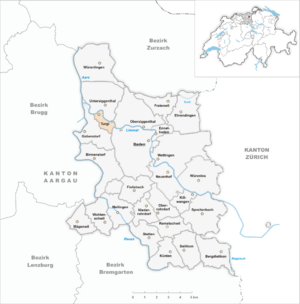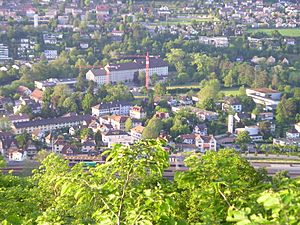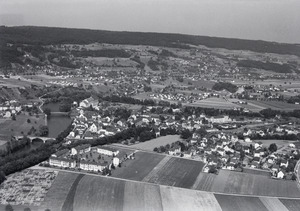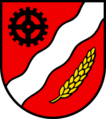Turgi facts for kids
Quick facts for kids
Turgi
|
||
|---|---|---|
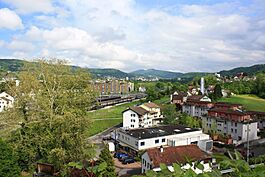 |
||
|
||
| Country | Switzerland | |
| Canton | Aargau | |
| District | Baden | |
| Area | ||
| • Total | 1.55 km2 (0.60 sq mi) | |
| Elevation | 342 m (1,122 ft) | |
| Population
(Dec 2020 )
|
||
| • Total | 2,963 | |
| • Density | 1,912/km2 (4,951/sq mi) | |
| Postal code |
5300
|
|
| Surrounded by | Baden, Gebenstorf, Obersiggenthal, Untersiggenthal | |
Turgi was once a small town, also called a municipality, in Switzerland. It was part of the Baden district in the canton of Aargau. Turgi is located in a beautiful area called the Limmat Valley. On January 1, 2024, Turgi joined with the larger town of Baden.
In 2002, Turgi won a special award called the Wakker Prize. This prize is given to towns that do a great job of keeping their old and important buildings safe and looking good. It means Turgi cared a lot about its history and unique architecture.
Contents
History of Turgi
Turgi became its own separate town in 1883. Before that, it was part of another town called Gebenstorf.
Geography of Turgi
Turgi covers an area of about 1.5 square kilometers (0.6 square miles). A little bit of this land, about 17.6%, is used for farming. A larger part, about 35.9%, is covered by forests. Most of the land, about 42.5%, has buildings or roads on it. The rest, about 3.9%, is made up of rivers or lakes.
Turgi's Coat of Arms
Every town has a special symbol called a coat of arms. Turgi's coat of arms shows a red background with a wavy silver stripe going across it. Above the stripe, there is a black gear wheel, which often represents industry or factories. Below the stripe, there is a golden ear of wheat, which can stand for farming or growth.
People and Population
Turgi has a population of about 3,000 people. In 2008, about 40.5% of the people living in Turgi were from other countries. Over the past ten years, the number of people living in Turgi has grown by about 17%.
Most people in Turgi speak German, which is about 73.2% of the population. Italian is the second most common language, spoken by 7.6% of the people. Albanian is the third most common language, spoken by 3.2% of the people.
In 2008, about 11.5% of the population were children aged 0 to 9 years old. Another 10.4% were teenagers aged 10 to 19. Most of the adults were between 20 and 59 years old. About 17.4% of the population were seniors, aged 60 and older.
In 2000, there were many different types of homes in Turgi. About 199 homes had only one or two people living in them. About 650 homes had three or four people. And 225 homes had five or more people. On average, there were about 2.15 people living in each home.
Education in Turgi
Education is very important in Turgi. About 65.7% of adults aged 25 to 64 have finished high school or gone on to higher education, like university.
In the 2008/2009 school year, there were 224 students attending primary school in Turgi. There were also 171 students attending university-level schooling.
Economy and Jobs
In 2007, Turgi had a low unemployment rate of 3.37%. This means most people who wanted a job could find one.
- Farming Sector: Only a few people (7 people) worked in farming. There were 2 businesses related to farming.
- Industry Sector: A large number of people (1,162 people) worked in factories or other industries. There were 20 businesses in this area.
- Service Sector: Many people (485 people) worked in service jobs, like shops, offices, or healthcare. There were 85 businesses in this sector.
In 2000, about 1,307 people lived in Turgi and had jobs. Most of them (about 83.5%) worked outside of Turgi. However, 1,560 people came into Turgi for work. This means Turgi had more jobs than people living there who needed them.
Many people used public transportation (35.5%) or private cars (37.8%) to get to work.
Transportation
Turgi has its own train station, called Turgi railway station. It is a stop on the S-Bahn Zürich S12 line. This makes it easy for people to travel to and from Turgi by train.
Religion
Based on the 2000 census, about 43.5% of the people in Turgi were Roman Catholic. About 24.4% belonged to the Swiss Reformed Church. A very small number of people (0.13%) were part of the Christian Catholic faith.
Images for kids
See also
 In Spanish: Turgi para niños
In Spanish: Turgi para niños
 | May Edward Chinn |
 | Rebecca Cole |
 | Alexa Canady |
 | Dorothy Lavinia Brown |





